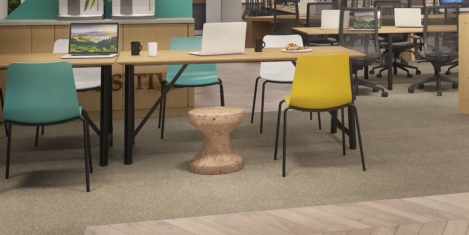September 21, 2018
When workplace strategy builds bridges between people and place
 The world of work is changing rapidly and profoundly in a way that we haven’t seen since the time of the industrial revolution. Yet even as we stand at a momentous, game-changing inflexion point, the 21st century workplace strategy sector is still dithering about whether to join in the revolution. They are like the industrial mill owners of 19th century England who adopted a ‘make do and mend’ approach to business and failed to invest in new technology only to be forced out of business by foreign competitors who had invested in radical new, state of the art technology.Today the technological game changer is digital technology rather than weaving technology, but the effect is the same. Unless the workplace strategy sector embraces change and builds bridges between the ‘people’ side of the business and the ‘place’ side with other workplace specialists, their industry will become as dead as a dodo.
The world of work is changing rapidly and profoundly in a way that we haven’t seen since the time of the industrial revolution. Yet even as we stand at a momentous, game-changing inflexion point, the 21st century workplace strategy sector is still dithering about whether to join in the revolution. They are like the industrial mill owners of 19th century England who adopted a ‘make do and mend’ approach to business and failed to invest in new technology only to be forced out of business by foreign competitors who had invested in radical new, state of the art technology.Today the technological game changer is digital technology rather than weaving technology, but the effect is the same. Unless the workplace strategy sector embraces change and builds bridges between the ‘people’ side of the business and the ‘place’ side with other workplace specialists, their industry will become as dead as a dodo.















 The latest generation of workplace recruits, the so-called Gen Z graduates, are more likely to stay in their first role if flexible working and mentoring is on offer, new research claims. According to graduate jobs board Milkround, while over half (55 percent) of new graduates’ plan to stay in their first role for less than two years, 76 percent can be encouraged to stay longer with training/mentorship and 63 percent with flexible hours. They are also ambitious and have high expectations, with 65 percent believing they will work in their dream industry. This impacts what is expected of employers and could hold the key to encouraging this new generation to stay in roles longer. This change in expectations begins before they start their new role – 68 percent of graduates are calling for more detailed job descriptions and 57 percent would like to have an open line of communication with their line manager from the moment they accept a job.
The latest generation of workplace recruits, the so-called Gen Z graduates, are more likely to stay in their first role if flexible working and mentoring is on offer, new research claims. According to graduate jobs board Milkround, while over half (55 percent) of new graduates’ plan to stay in their first role for less than two years, 76 percent can be encouraged to stay longer with training/mentorship and 63 percent with flexible hours. They are also ambitious and have high expectations, with 65 percent believing they will work in their dream industry. This impacts what is expected of employers and could hold the key to encouraging this new generation to stay in roles longer. This change in expectations begins before they start their new role – 68 percent of graduates are calling for more detailed job descriptions and 57 percent would like to have an open line of communication with their line manager from the moment they accept a job.
















September 18, 2018
Building a culture of creativity that unites the physical and digital workplace
by Serena Borghero • Comment, Technology, Workplace design
(more…)